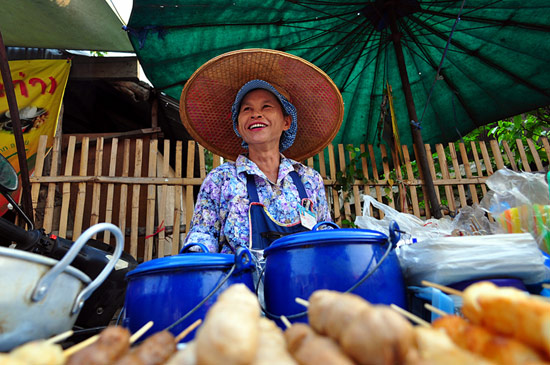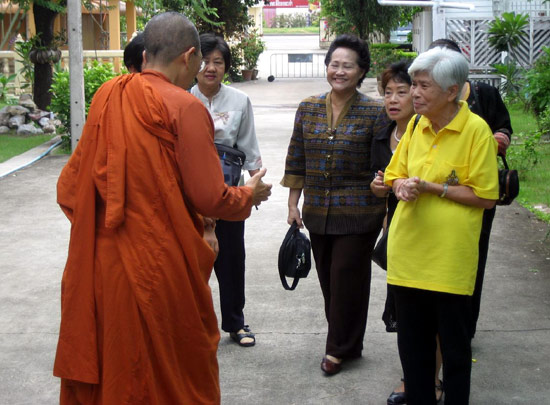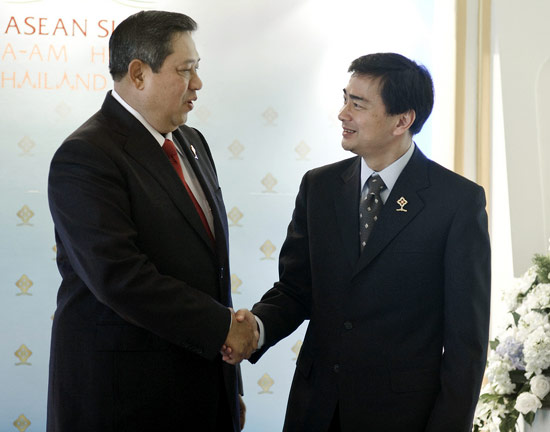Culture and Society: Greetings and Courtesies
General
Greetings and courtesies in Thailand are strongly influenced by the Buddhist penchant for compassion and hospitality as much as traditional hierarchies within the family, the workplace, and society as a whole. Thailand’s nickname, "The Land of Smiles," is likely derived from the population's outwardly cordial social relations.
Informal Greetings
Due to the influence of Western ways, a mild handshake is rapidly becoming the standard greeting between men and women who know each other well. Both parties smile throughout the encounter. In informal settings, Thais tend to address one another by their first names.
When meeting someone in an informal situation, Thais say, Sàwàtdee (Hello) and Sàbaai dee rĕu? (How are you?), to which a man would reply, Sàbaai dee króp (I’m fine, thanks) or a woman, Sàbaai dee kâ (I’m fine, thanks). They then return the question with, Leaw kunla? (And you?). Common responses include Kordee (Good) and Reauy-reauy (So-so).
To meet a stranger in an informal situation, a Thai asks, Kun chêu aria? (What is your name?). The appropriate response for a man is, Pŏm chêu___ (My name is___), and for a woman, Dìchăn chêu (My name is___). After introductions, Thai friends express pleasure with, Yin dee têe dâi róo jàk (Pleased to meet you) or, if they are well acquainted, Chăn kít tĕung ter (I missed you).
At the close of an informal get-together, a Thai might say, Laa gòn ná (Goodbye) and Tîeow hâi sà-nùk (Have a fun trip).
Formal Greetings
Formal greetings in Thailand extend not only to officials, teachers and professional superiors, but to older members of one’s own family. Elder respect is a crucial cultural more in this part of the world. The younger or subordinate person is expected to initiate a wai to the older or higher ranking person, regardless of gender. This involves pressing the palms together, fingers pointing upwards, thumbs against the chest. The higher the hands are raised, the more respect will be exhibited. The most respect will normally be accorded to the aged.
The more senior person will usually offer a small wai in return, but not if the social distance between the two is too great. In formal group meetings, the host or hostess will typically introduce everyone to each other. This helps all present to understand the social dynamics at play and thus who will be performing the wais. In formal situations, people tend to use the honorific Khun, followed by the person's first name. Thai names are traditionally written with the family name first.
In a formal encounter, a Thai is likely to say, Sàwàtdee krup (Good morning) or Sàwàtdee kha (Good evening). The language then more or less follows informal greetings (see above), with the exception of the very polite Kŏr hâi dern taang doi sà-wàt-dì-pâap (I wish you a safe journey).
Business Greetings
Business greetings largely follow formal protocol. Additionally, the strict hierarchy of Thai society compels businesspeople to be sticklers for honorifics. Khun is perhaps the most popular one in business circles, but Doctor is also commonplace. Thais do not usually address one another by specific job titles. Foreign partners are permitted to address Thai businesspeople with the English "Mr.", "Mrs." or "Miss," followed by their family name. Foreigners will likely be addressed in the same fashion.
As with other Southeast Asian countries, business cards occupy an almost ritualistic space in the Thai commercial world. A card is seen to be an extension of one’s professional reputation and ability. They are typically exchanged during a first meeting with both hands, followed by a bow. Thais consider it reverential to take a few moments studying the text. Foreigners are expected to translate their cards into Thai, and may take advantage of the competitive local trade in such translation.
Conversation Topics
The Thai affection for family and friendship means that time spent developing harmonious relations is time well spent. Thais communicate in coded terms and use body language a great deal, so comprehending one another in a social exchange can be a long-winded affair.
Thai conversations proceed with grinning politeness, the imperatives of "face" ensuring that everyone sticks to uncontroversial topics and communicates indirectly. Humor and harmony are the guiding watchwords. Thais appreciate discussions about their personal experiences, including family, work, and travel. They are also proudly nationalistic and love to sing the praises of the nation’s food, art, literature, music, landscape, and wildlife. As with other Southeast Asian countries, Thailand is obsessed with English Premier League soccer, so in-depth examinations of specific players and their statistics are commonplace.
Taboos
Slouching in a meeting and greeting context is considered to be rude and disrespectful. Reading a business card too quickly and putting it away is likely to upset a business partner, as it signifies a lack of both interest and deference.
Given the importance of the Thai social pecking order, using incorrect forms of address can cause offence in formal settings.
Glum or neutral facial expressions are thought to be a sign of suffering.
The Thai monarchy is held in such great esteem that the populace generally avoid discussing it at all. Security issues, such as the Islamist uprising along the border with Malaysia, are also taboo. Criticisms of any aspect of the state are likely to be regarded as a personal insult, especially if coming from a foreigner. This is a consequence of the collectivist mindset of Thai society.
Article written for World Trade Press by Tom Sykes.
Copyright © 1993—2025 World Trade Press. All rights reserved.

 Thailand
Thailand 

